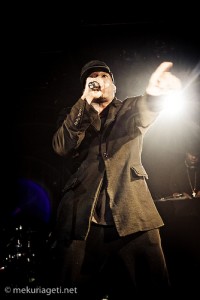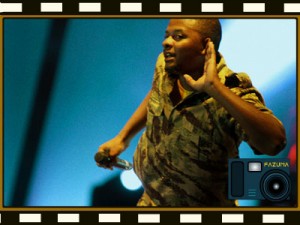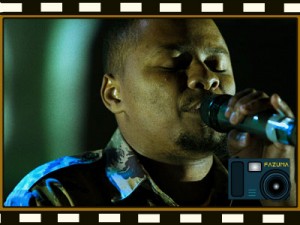In the past couple of weeks, the Mozambican blogosphere played host to debate on the role of hip-hop and the nature of legitimate “social critique”. This debate actually started two years ago [pt], except that in past weeks it has reached a new fervor.
One group of influential voices in the Mozambican blogosphere until recently has tended to dominate – a handful of social scientists who dialogue among each other. These bloggers are engaged in high-level debates, sometimes abstractions of current political issues, and at times their writing tends towards long treatises citing Weber, Marx and others.
Enter Mozambican MC Azagaia, who is a sociologist by day.
Prolific blogger — and sociologist — Carlos Serra [pt] recently wrote a post about the rapper that read the following, which kicked off the latest round of debate
Cada vez mais conhecido dentro e fora do país, o rapper Azagaia – Edson da Luz de seu real nome – deu uma longa entrevista ao “O País”, a conferir aqui [pt]. Creio que alguns ainda se lembram do quão atribulada foi a ascensão social do jovem cantor, com gente apostada em o destruir por completo a qualquer nível. Mesmo nos blogues, lembram-se?
One of Serra's readers posted the newspaper's interview with Azagaia, which serves as an introduction to Da Luz:
Azagaia é uma lança curta que é usada como arma de arremesso por caçadores. Por que escolheu Azagaia como seu nome artístico?
Quando escolhi este nome, não sabia que me tornaria o Azagaia de hoje. Na altura, era mesmo por questões de cultura e também musicais. Quando comecei a cantar rap, havia um grupo que se chamava Dinastia Bantu, que era mesmo para contrastar um pouco esta realidade de os rappers moçambicanos se inspirarem, completamente, em rappers americanos e usar nomes ingleses. Nós procuramos nomes que têm algo a ver connosco para, depois, tentar começar a luta por não só sermos globalizados, mas, se calhar, como forma de aproveitar essa informação que nos chega, para criarmos uma coisa que tem a ver connosco moçambicanos. É por que surge o nome Azagaia. Coincidentemente, veio mesmo a calhar porque, actualmente, tenho esta postura directa de fazer crítica social e há quem diga política também. Daí, por um capricho do destino, a minha postura na música tem muito a ver com o nome que adoptei há quase dez ou quinze anos.
When I chose this name, I didn’t know I would become the Azagaia of today. At the time, it was really for cultural and musical reasons. When I started singing rap, there was a group that called itself Dinastia Bantu [Bantu Dynasty], that was really to stand out a little from the reality from which the Mozambican rappers drew inspiration, completely, in American rappers and using English names. We looked for names that have something to do with us so as to, afterwards, try start to struggle against being globalized, but perhaps, as a way to take advantage of the information that was coming to us, to create something that has to do with us Mozambicans. That’s where the name Azagaia came from. Coincidentally, it came to really stick because, at the moment, I have this direct posture of social criticism and there are some who would say political as well. So then, because of a twist of fate, my posture in music has a lot to do with the name I adopted almost ten or fifteen years ago.

Photo by Flickr user getinet – Rapper Q-tip © mekuria getinet / mekuriageti.net – used under a Creative Commons License
In 2005, Azagaia and his peers, a number of young MCs, founded a record label in Maputo called Cotonete Records (or “Q-tip Records”, in what must be a nod to the American rapper-producer [en] from the seminal group A Tribe called Quest). Cotonete really took off in late 2007, after Azagaia’s single “As Mentiras da Verdade” achieved great success and his Babalaze — “the most awaited album of 2007” according to Magus DeLirio [pt].
Citing the lyrics of “As Mentiras da Verdade” from the blog Ideias para Debate [pt]
E se eu te dissesse
Que Moçambique não é tão pobre como parece
Que são falsas estatísticas
E há alguém que enriquece
Com dinheiros do FMI,OMS e UNICEF
Depois faz o povo crer
Que a economia é que não cresce […]Se eu te dissesse
Que a história que tu estudas tem mentiras
Que o teu cérebro é lavado em cada boa nota que tiras
Que a revolução não foi feita só com canções e vivas
Houve traição, tortura e versões escondidas […]E se eu te dissesse
Que a Polícia da República é uma comédia
São magrinhos, sem postura e se vendem por uma moeda Agora matam-se entre eles traição na corporação
Afinal de contas quem é o polícia, quem é o ladrão? […]
That Mozamique is not as poor as it seems
That they are false statistics
And there is someone getting rich
With money from the IMF, WHO and UNICEF
Then they make people believe
That the economy is not growing […]
If I told you
That the history you study has lies
That your brain is washed with every good grade you get
That the Revolution wasn’t just made of songs and “long lives!”
There was betrayal, torture and hidden versions […]
And if I told you
That the National Police is a comedy
They are skinny, with no backbone and sell themselves for pocket change
Now they are killing each other, betrayal in the corps
In the end, who are the police and who are the thieves?
“As Mentiras da Verdade” (a play on words meaning “True Lies”) got radio play in Mozambique and already provoked debate among the social scientists of the blogosphere. Back in 2007, sociologist Patrício Langa [pt] honed in immediately on the notion of “truth” — questioning whether Azagaia was truly interested in the “truth” [pt] (a “social critique based in reason”) or instead a “social intervention”.
Na verdade Azagaia, como ele próprio reconhece, não inventa nada do que diz, apenas faz eco a aquilo que as pessoas dizem nas esquinas e corredores, portanto, ao conhecimento popular. Aquele conhecimento daqueles que não tem tempo nem paciência para conviver com a dúvida enquanto avaliam as premissas. É um conhecimento do senso comum, portanto, apriorístico, intuitivo, assistemático. Na verdade é um não – conhecimento ou desconhecimento. Azagaia não faz perguntas, dá respostas. E as respostas que nos oferece, não são respostas novas.
To cite a response to Langa on the Cotonete Records blog [pt] from Jorga Gazy:
Entao, se a musica de Azagaia está ou não baseada em factos comprovados na prática, isso pouco nos interessa, o que mais nos interessa no meu ver, e que as músicas desse jovem refletem exatamente o senso comum do povo moçambicano, portanto, o que antes era comentado em casa, nas esquinas e etc., o que a muitos levanta duvida, questões, e hoje e tratado de uma forma aberta, sem medo de censura ou represálias de quem quer que seja. A música do Azagaia convida a todos, os que já “sabiam” e os que “não sabiam” a reflectir sobre os temas/assuntos socio-políticos.
A recent report on freedom of speech from the Media Institute of Southern Africa [pt] found that “new techniques” for silencing journalists were in use in 2007, including the use of legal means to intimidate journalists. That said, while the state does own the largest media outlets, frontal critiques of the Frelimo government do indeed appear in a number of private newspapers and to some extent on a couple of new TV stations.
Azagaia followed “As Mentiras da Verdade” with a number of provocative singles, including “A Marcha” and, immediately following on the riots in February 2008 over the price of transport and food in Maputo, “Povo no Poder” (“People in Power”). The track, recorded only three days after an informal strike organized by SMS caused poor neighborhoods to be blockaded and groups of disaffected youth to take their frustration out in the city. When the February 5 disturbances ended, 100 people had been injured (including 68 shot by the police), and at least five people died from their injuries. (For more see this Global Voices post [en].)
In this context “Povo no Poder” was undeniably provocative, most definitely an act of “intervention”. According to Cotonete Records, the song was downloaded over 1,000 times per day in its first week online and the label released a studio video due to the popular response.
Quoting the lyrics from a blog called divagancias [pt]:
Agora pedem o que?…Ponderação
Pondera tu, antes de fazeres a merda
De subires o custo de vida
E manteres baixa a nossa renda
Esse governo não se emenda mesmo…NÃo
Vai haver uma tragédia mesmo…SIM
Mesmo…
Que venham com gás lacrimogénio
A greve tá cheia de oxigénio
Não param o nosso desempenho
Eu vou lutar, não me abstenho
You consider then, before doing this shit
Raising the cost of living
And maintaining our incomes so low
This government really does not change… NO
There is really going to be a tragedy… YES
Really…
Bring them on with tear gas
The strike is full of oxygen
They can’t stop us from carrying this out
I’m going to struggle, I won’t stand down
Blogger Zenaida Machado [pt] reported in February 2008 that Azagaia was (unofficially) banned from radio
Ouvi um director dizer: “dizem que a canção insulta o presidente da Republica…”
Outro disse: “Eh! Não quero problemas…é melhor não tocarem isso.”
E outro ainda: ” Recebi uma chamada de superiores a mandar parar de tocar Azagaia…”
Another said: “Yeah! I don’t want problems… it’s best not to play this.”
And yet another: “I received a call from superiors telling me to stop playing Azagaia…”
Prosecutors questioned Edson da Luz in April 2008 [pt] for potentially inciting violence. No charges were ever made against the rapper, but the incident helped maintain his high profile.
In mid 2008, Azagaia returned to the attention of the blogosphere when he wrote on the Cotonete blog [pt] about his invitation to appear on state television in a show called “Moçambique em Concerto” (“Mozambique in Concert”), an invitation that was rescinded at the last minute. Azagaia never received an explanation for why, and speculated about why he was dropped.
Será isto censura? Não basta não passarem os meu video clipes? Não me atrevo a responder a tais perguntas, senão ainda corro o risco de ir parar na Procuradoria da Cidade pela segunda vez, quem sabe acusado de difamação e calunia, nunca se sabe!
Patrício Langa, who proclaims he told himself he would stop writing about Azagaia, responded [pt] to the rapper’s blog entry and expanded the criticism to other blogger(s) who he calls “consecrated academics” (what could be interpreted as a veiled criticism of Carlos Serra):
A crença, penso, está a ser um factor fundamental na produção social de Azagaia como um mártir. A crença é uma forte convicção sobre alguma coisa. A ideia de que existe uma conspiração para silenciar Azagaia e o seu efeito é um exemplo disso. Quero enfatizar aqui, e já o fiz noutros escritos, que uma crença pode até ser infundada, i.é., não ser baseada em razões plausíveis, mas tem sempre efeitos reais. A crença que Azagaia, e tantas outras pessoas em Moçambique, têm de que é perseguido pela Frelimo [pt] pode até ser infundada, mas tem efeitos reais nas acções daqueles que acreditam incluído o próprio Azagaia. Em conversava com dois amigos sobre a carta um deles sugeriu que se por acaso Azagaia torcesse o pé no seu banheiro, provavelmente, acharia que é obra da Frelimo. Este tipo de crenças é até legitimada por académicos consagrados, em seus espaços de reflexão, conferindo autoridade douta a crenças populares sem o mínimo questionamento. Um mau atestado a profissão!
Nelson Livingston opined on his blog Meu Mundo [pt] in July 2008, after this episode of Azagaia debate in the blogosphere in which “people called each other names” and “academized insults were traded”:
Tem sido para mim interessante como Azagaia “caiu nas mãos” dos académicos. Debateu-se e ainda se bate muito sobre esse jovem musico. Eu que não sou académico coisíssima nenhuma, as vezes me junto a esses debates umas vezes para fazer um “check up”, quantificar a minha ignorância e outras vezes para ver o tanto de “assumptions” que os verdadeiros académicos trazem nas suas maletas. […]
Eu nao vou entrar entrar nessa historia de ser ou não ser critico social. Não tenho fibra para discutir esses conceito “chatos”. Conceitos que às vezes até são simples mas os académicos fazem questão de complica-los só para nos porem de fora das suas conversas académicas. Para mim Azagaia é um contestador. Um contestador irreverente que encontrou na musica um forma de expressar o que lhe vai na alma em relação as coisas do seu pais. Feliz ou infelizmente, o que vai na alma de Azagaia vai também na de muitos Moçambicanos que lhe fazem o coro. Azagaia nos leva a questionar o discurso oficial o que é muito saudável pois nos da a possibilidade de olhar para as questões sob pontos de vista diferentes. A credulidade ingénua a que muitas vezes somos obrigados atrofia nossa capacidade critica pois nos torna espectadores e consumidores passivos. Vamos por exemplo olhar para a musica Mentiras das verdades, Azagaia nao diz nenhuma verdade e nem diz nenhuma mentira, sugere apenas que nos perguntemos ate que ponto o que nos dizem ser verdade realmente o é?
I’m not going to enter into this story of being or not being a social critic. I don’t have what it takes to argue with these boring concepts. Concepts that are sometimes even simple but the academics make a point of complicating them to keep us out of their academic conversations. For me, Azagaia is a challenger. An irreverent challenger that found in music a way to express of that he feels in his soul in relation to things in his country. For good or for bad, what is in his soul is also in the soul of many Mozambicans who are his chorus. Azagaia brings us to question the official discourse which is very healthy because it gives us the possibility to see issues through different points of view. Innocent belief, that which is often forced on us, atrophies our critical capacity because it turns us into spectators and passive consumers. Let’s look for example at the song “Mentiras da Verdade”, Azagaia does not utter any truth or any lie, he merely suggests that we ask ourselves up to what point what they tell us is the truth really true?
Reader Dede Moquivalaka replied
Deu para uma gargalhada oh Nelson. Pensei que estivesse tao so’ no grande debate dos sociologos…naquela mania de ‘sofisticarem’ o sujeito e o objecto de analise,…que certamente foi uma arma para deixar muitos de fora.
In late 2008, Azagaia participated in the mayoral campaign of independent Deviz Simango in Beira, appearing at rallies in the city to large audiences, captured on the blog of Serra [pt], who has been his biggest supporter in the Mozambican blogosphere.
Which brings us back to Serra’s recent assertion that Azagaia has become more popular than ever. This provoked a strong reaction [pt] from none other than Patrício Langa, who decries what he deems azagaism, characterized by the “vain glory of criticizing”
Digamos que Azagaia, que veste a pele do músico Edson da Luz, se tenha tornado mais popular dentro e fora do país. Tornou-se? Em que proporção? Ainda que tenha isso, é o que menos importa aqui. Por si, a popularidade, coloca-o do lado da razão, no que tange conteúdo problemático de suas letras? Felizmente a razão não é popular, como a demagogia. Minorias podem ter razão, mesmo que para a maioria isso não seja conveniente. Qual é a diferença entre uma multidão linchadora e Azagaia?
Elísio Macamo [pt] responds to Langa’s critiques and throws in a little historical perspective on demagoguery during the colonial and then the revolutionary socialist period
O fantasma que está a ser ressuscitado é o do inimigo comum. No período colonial trazia o nome de “turra”. Era a tentativa do regime colonial de reforçar o sentimento de comunidade através da criação da imagem de um inimigo que punha a “comunidade lusitana” em perigo. O regime colonial foi-se. Veio a Frelimo revolucionária que se fartou de criar inimigos comuns: Xiconhocas, inimigos internos, sabotadores, capitalistas, burgueses, bandidos armados (num sentido metafórico), reaccionários, etc. Aqui também o objectivo era o mesmo, nomeadamente o de reforçar o sentimento de comunidade através da criação da imagem de um inimigo que punha a criação do “homem novo” e de uma “sociedade socialista justa e livre” em perigo… E o “crítico”, como é natural, critica com toda a propriedade que o que anda mal entre nós legitima. Mas, e à semelhança do regime colonial e da Frelimo revolucionária, ele critica muitas vezes sem substância e prefere, antes pelo contrário, despender toda a sua energia na criação do “inimigo comum”.
Judging by the past two years, there will be no consensus any time soon in the Mozambican blogosphere about Azagaia. But Macamo’s reference to “common enemies” of the past curiously resonates with Azagaia’s most recent video “Combatentes da Fortuna” which contains footage of Mozambique’s first President Samora Machel.









7 comments
de facto és um rap de verdade que nunca tivera ouvido na face da terra, gostaria que falasses mais a nivel africano e nao so moçambicano porque sou angolano e gostaria que falasses tambem no proximo album da historia de angola
Olá josemeu, obrigada pelo comentário. Mencionámos o rap político do Brigadeiro Mata Frakuxz no post sobre a tentativa de manifestação em março. Mas de facto seria interessante fazer mais coberta de hip hop, obrigada pela sugestão.
http://pt.globalvoicesonline.org/2011/03/16/angola-manobra-de-antecipacao-anula-revolucao/